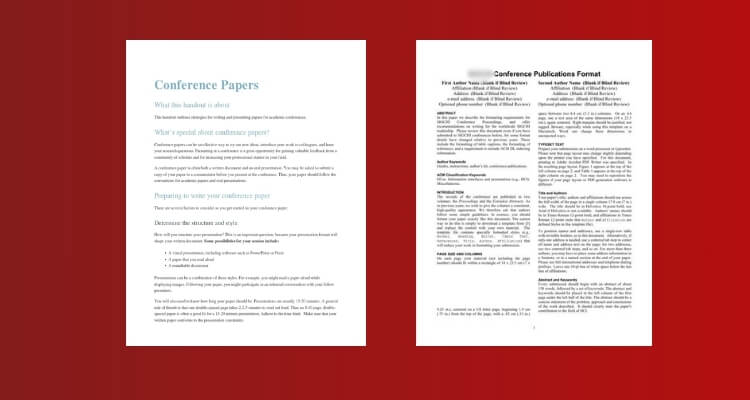Conference papers play a pivotal role in advancing knowledge across various academic fields. They offer researchers a platform to share groundbreaking ideas, receive valuable feedback, and connect with fellow experts. By presenting preliminary findings, these papers often ignite discussions that shape future research directions.
But is a conference paper academic or non-academic? This is a common question among scholars and students alike.
A conference paper is indeed considered academic. It delves into a specific research area, presenting the author’s findings and methodologies. As a written document complements an oral presentation, it significantly contributes to scholarly discussions within the academic community.
If you’re interested in understanding more about the academic nature of conference papers and their impact on research, read on to explore their significance in greater detail.
What is a Conference Paper and What is Its Purpose?
A conference paper is a research-based document presented at a professional or academic conference. It allows scholars to share ideas, findings, and theories with other experts in their field. Such papers foster discussions and provide networking opportunities that can lead to valuable collaborations. Many researchers look for reliable conferences to join where they can present, learn, and gain feedback on their work.
The purpose of a conference paper goes beyond just presenting findings; it also helps researchers gain recognition. It enables authors to receive constructive critique from others, refining their ideas for future work. Presenting at conferences also allows scholars to stay updated on the latest trends and methods in their fields. Moreover, attending these events promotes career growth and enhances their professional visibility within their discipline.
Is a Conference Paper Academic or Non-Academic?
A conference paper is an academic document that researchers present at professional or scholarly events. Authors write these papers to discuss detailed studies, theories, or findings in specific fields. Such papers undergo review processes that check their quality and relevance within the discipline. Conference papers thus contribute to academic knowledge and encourage future research in specialized areas.
Key Characteristics that Make a Conference Paper Academic
Conference papers hold a respected position in the academic world due to their adherence to rigorous standards. They provide a platform for scholars to share new research findings with peers and receive constructive feedback. Here are the essential characteristics that make a conference paper academic, ensuring it meets scholarly expectations and contributes effectively to the field.
Specific Research Focus
An academic conference paper addresses a clear, well-defined research question that contributes something unique to the field. Authors thoroughly investigate a focused topic, often building on prior studies or theories. This focus brings depth to the work, one of the major advantages of publishing a conference paper in an academic forum.
A sharp focus allows for a thorough examination of a hypothesis, leading to meaningful, concrete conclusions. It ensures that the research stays relevant and engages a specific audience interested in similar studies. This characteristic encourages discussions that promote further explorations on closely related topics.
Structured Format

The structured format guides readers in assessing the paper’s value, moving from the context to the results seamlessly. It also offers researchers a clear framework to present their research findings in a logical order. This approach ensures clarity and completeness, which makes complex information more accessible.
Comprehensive Literature Review
A literature review sets the stage by providing background and context for the current research. It summarizes prior work, highlighting gaps or unresolved questions that the new study addresses. This section also establishes the scholarly relevance of the topic within the existing body of knowledge.
Including a literature review confirms the paper’s alignment with academic standards, demonstrating a foundation in prior research. By connecting the study to other research, it shows the author’s awareness of relevant contributions. This background helps readers understand the significance of the presented findings.
Methodical Data Presentation
Academic papers use data systematically, often enhanced with tables, figures, or citations for visual support. These elements help communicate complex information in a clear, digestible format, facilitating understanding. This methodological approach is essential, ensuring data presentation remains both detailed and accessible.
Presenting data in an organized way allows readers to assess the research validity easily. Consistent data organization further strengthens the paper’s academic merit by offering transparency. This approach also encourages replication or comparison in future studies, fostering scientific advancement.
Objective and Formal Tone
The tone of a conference paper is formal and objective, focusing on factual information rather than personal opinions. This objectivity lends credibility to the research, as it demonstrates an unbiased examination of the topic. The author presents findings clearly, avoiding language that could imply unsupported conclusions.
A formal tone ensures the research is respected within the academic community, as it focuses on facts and evidence. The language remains straightforward yet precise, minimizing ambiguity for readers. This clarity in tone helps readers concentrate on the findings and their implications.
Accurate Citation and Referencing
Conference papers adhere to strict citation rules, ensuring proper acknowledgment of sources that informed the research. Correct citations validate the research, building trust by showing the author’s respect for other scholars’ work. Proper referencing adds academic integrity, preventing issues of plagiarism and upholding scholarly ethics.
References allow readers to trace the origins of ideas, offering further insights or verifying claims. Accurate citation also places the research within a broader academic dialogue, showing its place among related studies. This transparency builds the foundation for honest and collaborative academic discourse.
How Do Conference Papers Contribute to Academic Research?
Conference papers play a crucial role in academic research, offering a platform for scholars to share findings, gather feedback, and explore new ideas. Through these papers, researchers gain insights from peers, refine their methodologies, and enhance their studies. Here’s how conference papers contribute meaningfully to academic research and drive scholarly growth.
Encouraging Peer Review and Feedback
Presenting papers at conferences enables researchers to receive real-time feedback from knowledgeable peers in their field. This constructive criticism allows scholars to identify areas that need refinement or clarification. Feedback encourages further exploration and pushes researchers to improve methodologies for accuracy. Peer review at conferences thus strengthens the overall quality and reliability of the presented research.
Promoting Networking and Collaboration
Conferences offer researchers the chance to connect with other scholars, fostering opportunities for collaborative projects and studies. Networking encourages the sharing of resources, ideas, and methodologies across different fields. Collaborations that emerge can lead to groundbreaking research by combining expertise and perspectives. Such exchanges build lasting professional relationships that enhance academic research.
Facilitating Knowledge Exchange Across Fields
Conference papers allow researchers from different disciplines to share their findings, creating cross-field knowledge exchange. This interdisciplinary approach often inspires novel ideas or innovative solutions to complex research problems. Exposure to diverse perspectives expands researchers’ understanding of their own field. Knowledge exchange at conferences thus drives research development and intellectual growth.
Advancing Publication Opportunities
Presenting a paper at a conference increases its visibility, enhancing chances for later journal publication. Many journals seek research that has been peer-reviewed at respected conferences. This step provides a pathway for conference papers to gain formal academic recognition. Increased publication opportunities help disseminate valuable research more widely within the academic community.
Strengthening Research Methodologies
At conferences, researchers gain exposure to various methodologies, prompting them to enhance or refine their approaches. Learning from others’ methodological successes and challenges builds stronger, more effective research practices. This exposure ultimately sharpens a researcher’s skills and improves the reliability of their studies. Refined methodologies contribute to more rigorous, high-quality academic research.
Inspiring Future Research Directions
Conference papers often identify gaps or unresolved questions, inspiring future research directions for others in the field. Presenting ideas to a scholarly audience can reveal potential areas for additional study. Scholars frequently build on conference papers to develop comprehensive research projects. This continuous cycle of discovery drives academic research forward.
Benefits of Presenting an Academic Conference Paper
Presenting an academic conference paper offers numerous benefits, helping researchers grow both professionally and personally. It’s a chance to showcase research findings, engage with peers, and refine ideas through discussion. Here’s how presenting at a conference can truly enhance a scholar’s academic journey.
- Sharing research at conferences increases visibility, allowing others in the field to recognize the researcher’s contributions. This visibility can lead to valuable career connections and further professional opportunities.
- Presenting at conferences helps scholars receive real-time feedback, enabling them to refine their research for better accuracy. Constructive critique strengthens the study, improving its academic value.
- Networking at conferences opens doors for collaboration, fostering relationships with other scholars and experts. Collaborative projects can emerge, combining expertise and leading to groundbreaking research developments.
- Exposure to diverse ideas broadens researchers’ perspectives, enhancing their understanding of complex topics within their field. This broadened perspective contributes to more comprehensive and innovative future research.
- Engaging in discussions about their work builds confidence and hone communication skills essential for presenting complex ideas. Clear communication is vital for sharing research effectively with a broader audience.
- Conference presentations often lead to publication opportunities, helping researchers achieve wider recognition in academic journals. Journal publications elevate a study’s impact, benefiting the researcher’s academic reputation.
Tips to Help You Present an Academic Conference Paper
Presenting an academic conference paper can feel daunting, but with some preparation, it becomes an enriching experience. Knowing how to effectively share your research will help you make a lasting impact. Here are some tips to help you present confidently and engage your audience.
Practice Thoroughly and Know Your Content
Spend time practicing your presentation, focusing on the key points you want to convey. Familiarity with your material will help you answer questions confidently. This preparation also allows you to maintain eye contact, which builds audience engagement. When you know your content well, you can avoid reading directly from slides.
Start With a Strong Introduction
Begin by introducing yourself and explaining why your research matters to the audience. A strong start will capture your attention and set the stage for your findings. Ensure that your audiences understand the value of your research in the related field. Let them understand the differences between journal and conference publications so that they can grasp the relevance of your research.
Use Clear Visual Aids
Visual aids like slides or charts should support your points without overwhelming the audience with details. Keep text minimal, using visuals to illustrate complex data or findings effectively. Use charts or graphs to simplify numbers, helping your audience absorb information easily. Clear visuals enhance understanding and keep your presentation engaging.
Focus on Key Findings and Insights
Rather than diving into every detail, emphasize the most significant findings and their implications. Highlighting key insights makes your presentation memorable and prevents information overload. Relate these findings to larger questions or trends in your field for added relevance. Connecting results to the audience’s interests enhances engagement and impact.
Prepare for Audience Questions
Anticipate possible questions by reviewing your material and considering potential areas of curiosity. Practicing responses will boost your confidence when questions arise, making you feel prepared. Listen carefully to each question to provide a thoughtful, respectful response. Handling questions well builds credibility and encourages meaningful dialogue.
FAQs About Is a Conference Paper Academic or Non-academic?
Conference papers often raise questions about their academic status and impact on scholarly research. Understanding their role can help students and researchers understand academic publishing effectively. Here are some frequently asked questions about whether conference papers are academic or non-academic.
Are All Conference Papers Considered Academic Publications?
Yes, conference papers are generally considered academic publications because they present original research and often undergo peer review. They contribute to scholarly discourse and are recognized as credible sources within the academic community, enhancing the dissemination of knowledge.
How Do Conference Papers Differ From Journal Articles Academically?
Conference papers often present preliminary findings and are shorter than journal articles. While both are academic, journal articles typically undergo more strict peer review and provide comprehensive studies, whereas conference papers facilitate early sharing of research.
Do Conference Papers Count Towards Academic Credentials?
Yes, presenting and publishing conference papers can enhance academic credentials significantly. They demonstrate active engagement in research and contribute to a scholar’s professional reputation, which is valuable for academic promotions, tenure considerations, and grant applications within the academic field.
Can Conference Papers Be Cited in Academic Work?
Absolutely, conference papers can be cited in academic work. They are recognized as legitimate sources of scholarly information, allowing researchers to reference them when building upon previous studies or supporting their arguments in academic writings and research papers.
Are Conference Papers Subject to Academic Peer Review?
Yes, many conference papers undergo a peer review process, although it may be less extensive than that of journals. Peer review ensures the academic quality of the paper, validating its contributions and maintaining scholarly standards within the academic community.
Closing Remarks
Conference papers are a vital part of academia, providing a platform for researchers to share preliminary findings, gain feedback, and engage with the scholarly community. When pondering “is a conference paper academic or non-academic?” The answer is clear: conference papers are academic.
They uphold strict standards, contribute to the advancement of knowledge, and often undergo peer review processes. By participating in conferences, scholars not only enhance their own understanding but also contribute to collective learning and innovation.
Recognizing the importance of conference papers helps demystify the academic process for newcomers and encourages active participation. Embracing the academic nature of conference papers enriches both individual careers and the broader academic field.







